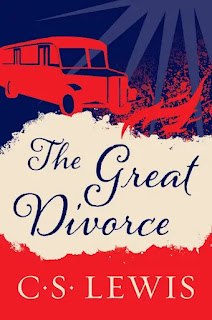Have you ever wondered why someone would choose Hell? I would hear it all the time growing up. Hell is a locked door but the lock is on the inside of Hell. I never could imagine that someone would voluntarily choose to suffer. The Great Divorce displayed how people choose Hell daily.
Synopsis
The narrator (I will call him Lewis for C.S. Lewis) finds himself in a vast gray town. It has a glow over it that you see at dusk or predawn, there is debate about whether the morning or night is approaching the town. This faint light never changes. Lewis stumbles around until he reaches a bus queue. He doesn't know what he is waiting for exactly but he is at the end of a long line. There is no way everyone can fit on he thinks, and then the line shortens. Fights break out, some people just leave of their own will and Lewis gets a seat on the next bus that arrives. He uneasily talks to the other riders until he looks outside to see that they are flying in the air to a high cliff. When they reach the cliff he sees a bright dawn and discovers a terrifying fact, they are all ghosts. The bus lands on a lush field of grass. The bus driver tells them that they can come back at any time or they can stay for the rest of time there if they want. As the ghosts exit the bus, they find that the grass hurts them like knives in their feet. This land is real and solid, unlike the ghost land they just left behind. The ghosts discover that they need the people of this land to help them toughen up so they can walk on their own to reach the mountain. This is when Lewis records the conflicts that arise between the ghosts and the solid people. This is when you see how people are offered a chance at eternal happiness but choose to suffer in eternal misery.
My Thoughts
Of the books that I could recommend, this is towards the top of the list. It has a fascinating overarching story with many smaller stories that force you to reflect on your own life. You will find at least one of the stories that relate to a situation you are going through or just finished going through. When I was a teacher, I used this book for my 8th-grade religion class. I wanted them to see how it is possible to reject heaven but also the remedies for each one.
As an example, one person demands his "rights." He is a good chap, who didn't take any handouts and he just wants his "rights" (to be in heaven). The solid person he is talking to murdered someone in a fit of rage. The ghost refuses to walk with the solid man because of that fact. He would rather be damned than walk to the mountain, heaven, with a murderer. The solid person admits that murder wasn't the worst he did. He had killed his boss, the ghost on Earth, in his heart many times. As an aside, Lewis is not supporting murder but simply saying we can kill people in a variety of ways. That murder in his heart was worse because the actual murder was of a quick passion, while the murder in his heart was a deliberate choice over the years. The ghost judges the solid man without reflecting on how he made life miserable for his workers and wasn't all that great of a guy. The solid man was sent to apologize for killing the ghost in his heart for so long. This points to a remedy for judging others, humility. Be honest with our faults, that we deserve nothing from God, and accept everything as a gift from that loving Father.
Another story that I like for the students is that of a ghost man and his lizard. This ghost has a lizard that is constantly whispering in his ear about the place. The man is annoyed by it and says that he only allowed the lizard to stay with him because it promised to be quiet. As they are arguing an angel approaches the man and offers to get rid of the lizard. The man agrees but then the angel says he will kill the lizard. After must hesitation in the man and pleading with the lizard, the man agrees to let the angel kill the lizard. When the lizard is killed it shrivels on the ground and transforms into a beautiful horse. The man then hops onto the horse and rides it to the mountaintop. The lizard was a sin that the man was attached to or that God allowed him to continue to struggle with. When it was overcome, it became the path to his sanctification. This is what we also see in St. Paul and his wrestling with a temptation that he asks God to get rid of. This gives the students, and myself, hope that God is still working with us, even in our temptations and falls into sin.
There are many stories that I find enjoyable and enlightening. I saw how my pride, ambition, attachment to sin, and other weaknesses can lead me away from heaven. I think this is a great book for teenagers and adults to read. It holds deep theological truths while presenting them in one of my favorite formats, a story.
If you want to support this blog, please order the book using the link provided: Click Here


Comments
Post a Comment